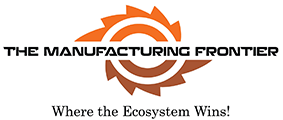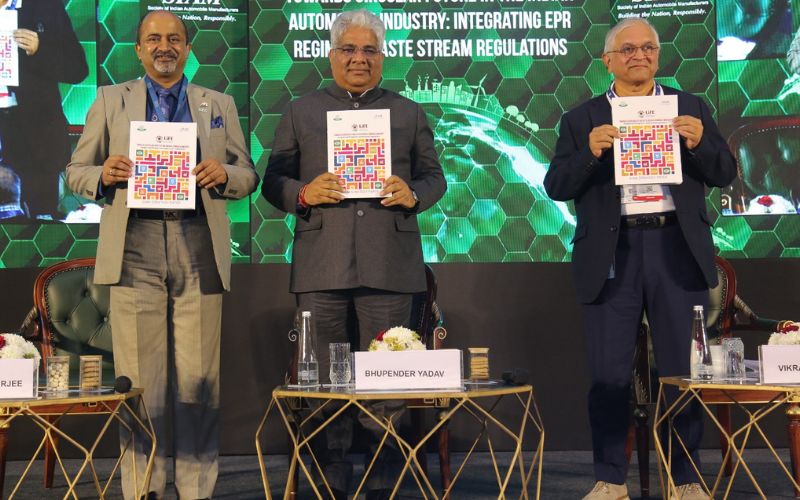“The rising India is ready to embrace and propagate the message of “Vasudhaiva Kutumbakam” while also balancing industrial growth and environmental sustainability. SIAM is committed to its responsibility in environmental stewardship and building the nation responsibly.” Prashant K Banerjee, Executive Director, SIAM
“As the automotive industry observes a notable growth, it is imperative to reflect on our environmental obligations. Nature, with its innate capacity for regeneration, serves as an exemplar for our operational strategies.” Bhupender Yadav, Union Minister of Environment, Forest & Climate Change, Government of India
“We need to emphasize recycling in the automobile industry. Furthermore, advancements in battery cell chemistry are essential to achieve the desired level of EV adoption in the country.” Vikram Kasbekar, ED and CTO, Hero MotoCorp
The Society of Indian Automobile Manufacturers (SIAM), the apex body representing the country’s leading automobile manufacturers, recently organized the 3rd International Conference on Sustainable Circularity (ICSC), themed “Nature Positive Recycling – Systemic Transformation to Automotive Circular Economy in India”, at Bharat Mandapam, New Delhi, on the sidelines of Bharat Mobility Global Expo 2025. The conference brought together key government officials, industry leaders, policymakers, academics, and sustainability advocates to discuss and strategize on integrating circular economy principles into the automotive sector in India.
The conference was graced by the Chief Guest Bhupender Yadav, Union Minister of Environment, Forest & Climate Change, Government of India. During the inaugural session of the conference, Hon’ble Union Minister also launched the SIAM Strategy Paper “Towards Circular Future in the Indian Automobile Industry: Integrating EPR Regime in Waste Stream Regulations”.
While welcoming the dignitaries and audiences, Prashant K Banerjee, Executive Director, SIAM, said, “The rising India is ready to embrace and propagate the message of “Vasudhaiva Kutumbakam” while also balancing industrial growth and environmental sustainability. SIAM is committed to its responsibility in environmental stewardship and building the nation responsibly.”
Addressing the conference, Chief Guest Bhupender Yadav, Union Minister of Environment, Forest & Climate Change, Government of India, said, “As the automotive industry observes a notable growth, it is imperative to reflect on our environmental obligations. Nature, with its innate capacity for regeneration, serves as an exemplar for our operational strategies. Our focus extends beyond mere waste management to stimulating economic development, diminishing emissions, and cultivating societal advancements through the promotion of green jobs. Initiatives such as the Vehicle Scrappage Policy 2021 and the endorsement of electric vehicles manifest our commitment to sustainable practices. As we navigate towards a circular economy, our actions must be guided by a steadfast dedication to environmental integrity and ecological stewardship. SIAM has done an admirable job of initiating discussions on circularity which showcases its commitment to the growth of the automotive sector and promoting India’s green goals.”
Vikram Kasbekar, ED and CTO, Hero MotoCorp, said, “We must respect our environment and align our actions with India’s ambitious target of achieving net zero by 2070. We need to emphasize recycling in the automobile industry. Furthermore, advancements in battery cell chemistry are essential to achieve the desired level of EV adoption in the country.”
The Thematic Session-1, themed “Impact of EPR on ELV Recycling and Compliance: New Paradigm of Material Circulatory”, was graced by the Guest of Honor, Arvind Kumar Nautiyal, Joint Secretary, Government of India and Member Secretary, CAQM and Guest of Honour Mahmood Ahmed, Additional Secretary, MoRTH. The session explored policy interventions, international practices, and innovations required for scaling up ELV recycling. The session also saw the launch of an approach paper on “Automotive Circularity in India”.
Guest of Honor, Arvind Kumar Nautiyal, Joint Secretary, Government of India and Member Secretary, CAQM, said, “With India’s rapidly expanding population, effective recycling becomes essential. Proper disposal of end-of-life vehicles through standardized recycling processes is crucial, underscoring the importance of Extended Producer Responsibility (EPR). By emphasizing innovation and R&D, we have implemented measures to ensure the efficient management of ELVs. Integrating ELVs into EPR demonstrates our commitment to sustainability in the automotive industry and supports the nation’s future environmental goals.”
Guest of Honor, Mahmood Ahmed, Additional Secretary, MoRTH, Government. of India, said, “Through Extended Producer Responsibility (EPR), the government places a crucial emphasis on sustainability by mandating that producers ensure the materials used in manufacturing are recyclable. Achieving circularity in the automotive sector demands active collaboration among stakeholders alongside heightened consumer awareness. The government is steadfast in its commitment to support the industry, fostering a sustainable and resource-efficient future.”
Sanjay Mehta, President, MRAI, said, “Circular economy is key to a sustainable future. By treating waste as a resource, we aim to achieve a zero-waste economy by 2070. The government champions circularity through policies such as the Steel Scrap Recycling and Vehicle Scrappage Policies. Inspired by the Prime Minister’s Mission LiFE, citizens are taking bold actions towards environmental sustainability. Together, we can build a resilient, resource-efficient nation driven by innovative sustainable practices.”
Timo Unger, Chairperson – Working Group on Materials & Substances, ACEA, commented, “We must prioritize the design of highly recyclable vehicles and the reduction of plastic components. Achieving this will require robust government support, consistent legislation, and collaborative efforts among stakeholders. Together, we can foster innovation, enhance sustainability, and promote a greener future for the automotive industry, thereby setting new benchmarks for environmental responsibility.”
Vikram Kasbekar, ED and CTO, Hero MotoCorp also addressed the session and said that the government is extending comprehensive support through targeted policy interventions, including the Vehicle Scrappage Policy and Waste Management Policy, among others.
While concluding the session, M S Anandkumar, Chair, SIAM Recycling & Material Group and SGM, TVS Motor Company, said, “Millions of end-of-life vehicles represent both a significant challenge and a substantial opportunity. The Extended Producer Responsibility regime advocates for recycling, lifecycle consideration, closed-loop systems, collaboration, the use of sustainable materials, and enhanced durability. By fostering collaboration and innovation, we can develop a globally benchmarked EPR system that transforms ELVs into valuable resources, paving the way for a sustainable future.”
The Thematic Session-2, themed “Regulatory & Policy Challenges and Innovating Solutions in the ELV Recycling Ecosystem”, was chaired by Rajendra M Petkar, President and CTO, Tata Motors Ltd; Chairperson, SIAM Sustainable Mobility Group. The session deliberated on regulatory and policy challenges the ELV recycling ecosystem encounters. It also discussed possible solutions and the necessity of innovation.
The session included presentations by R K Goyal, Director Saarloha Advanced Materials and Managing Director, Kalyani Steel, on “Sustainable Circularity for Green Steel Manufacturing in India”, Sonal Choithani, Vice President and Head of Market Development, Vedanta, on “Metals & Mobility: Building A Greener Future for Transportation, Sosho Kitajima, Chairman, Japan Automobile Recycling Alliance (JARA), on “ELV management landscape in Japan”, R Mukhopadhyay, Director (R&D) J K Tyres, on “Sustainable Circularity – Challenges & Opportunities for Tyre & Auto Rubber Components Industry”, ALN Rao, Head of Electronics Recycling, Recykal, on “Innovative Tech in Automotive Circularity”, David Nolan, Executive Director, Auto Recycler Association of Australia, on “Automotive Circularity landscape in Australia”, Sarvesh Tomar, General Manager, BPCL, on “Challenges and Opportunities in Used Oil Recycling in India: Paving the path to Sustainability, and Prabhjot Sodhi, Sr. Program Director, CEE, on “Policy interventions as catalysts for sustainable automotive circularity”.
The Thematic Session-3, themed “Harnessing Cutting-edge Technologies and Business Models to Revolutionize ELV Recycling”, was graced by the Guest of Honor Dr. Sujit Kumar Bajpayee, Member, Commission for Air Quality Management (CAQM), and moderated by Ashim Sharma, Senior Partner, NRI Consulting & Solutions.
While addressing the session, Guest of Honor Dr. Sujit Kumar Bajpayee, Member, Commission for Air Quality Management (CAQM), said, “Through technological innovation and progressive business models focused on recycling, we can effectively manage ELVs and reduce their impact on the environment. It’s critical to intensify nationwide awareness campaigns about the importance of recycling. Our vision is clear: to position India as a global leader in sustainable mobility, demonstrating our dedication to a cleaner, greener future.”
Vinod Babu, Director, CPCB, said, “Ensuring that our recycling infrastructure not only meets but exceeds standards is imperative. At CPCB, we’re focusing on metals to drive our commitment toward achieving EPR goals. We’ve implemented comprehensive recycling guidelines to bolster this mission. Moreover, we’re developing a one-stop platform to streamline all EPR liabilities and facilitate fair trading of certificates.”
Masaru Akaishi, Managing Director, Maruti Suzuki Toyotsu India Pvt Ltd, Kartick Nagpal, President, Rosmerta, Nitin Chitkara, CEO, Meta Material Circular Markets (MMCM), Prabhakar Bhangare, CEO, Global PCCS, Anant Bhargava, IFP Petro, also expressed their thoughts and opinion on the theme of the session.
The last Thematic Session-4, themed “Challenges and Way forward for Closing the Loop on Automotive Material and Components”, was graced by Guest of Honour, Mr. Ved Prakash Mishra, Joint Secretary – HSM, MoEFCC, Government of India, and chaired by Ms Kiran Sarkar, Co-Chairperson, SIAM Recycling & Material Groups and Head – Sustainability, Mahindra & Mahindra.
In his address, Ved Prakash Mishra, Joint Secretary – HSM, MoEFCC, Government of India, said, “The disposal of end-of-life vehicles (ELVs) and related materials presents a significant challenge, yet it also offers opportunities. Through effective management, we can not only lessen the environmental burden but also recover valuable secondary raw materials (SRMs) that are as useful as primary materials. With the recently notified ELV rules, the government showcases its commitment to support the recycling ecosystem.”
The conference emphasized the need for systemic transformation through regulatory frameworks, technological advancements, and collaborative efforts across stakeholders. The discussions underscored India’s potential to lead global efforts in sustainable automotive practices.

